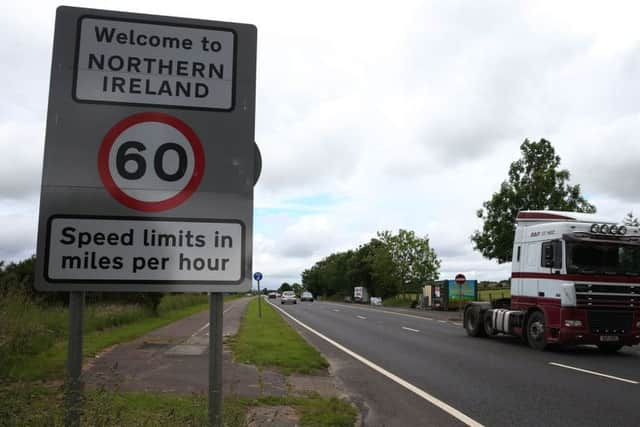Border problems only magnifying existing tensions


“The real danger for a hard border is not the resurgence of violence, although that’s certainly a problem. It is the change in attitude. If you reinstate a hard border you go back to the days when stereotyping resumes, demonisation resumes and people turn inward as opposed to outward and they lose the benefits that come from open borders. So yes, there could be serious trouble ahead. No society is immune from the regressive forces that are part of every problem.” (George Mitchell)
“The memory of that border is so toxic that no-one who knew it in the past wishes to see it return – in any form – in the future. Although new customs posts would not remotely be the same as the security apparatus of the past, the very fact of a physical border may reopen sectarian fears. It is possible that both nationalists and unionists will handle a new border with aplomb – but equally, they may not.” (John Major)
Advertisement
Hide AdAdvertisement
Hide AdAre they right? Well, if you shift the dynamics and tensions enough then yes, a return to violence cannot be dismissed as a possibility. In political/electoral terms Northern Ireland is clearly more polarised than it was in 1998. The palpable sense of hope and new opportunity that existed in 1998 has exploded into dust. The territory known as middle, moderate or centre has shrunk rather than expanded. The relationship between Sinn Fein and the DUP is worse than it has ever been and there is no likelihood of some sort of It’s A Wonderful Life miracle which will result in them reassessing their attitude to each other and delivering a genuinely stable, consensual deal. Twenty years ago both parties accounted for around 36% of the vote; today their joint base is heading towards 70%. Opinion polls suggest that voters are still concerned about health, education, employment etc; yet when it comes to voting they prioritise us-and-them over everything else.


The bulk of the evidence since 1998 indicates that we remain a deeply divided society. Indeed, we seem to have entrenched existing divisions and expanded new ones. And while young people – particularly those who started voting after 1998 – seem more willing to mix together in a way that was unthinkable when I moved to Belfast in 1974 (a time when whole areas of the city, along with clubs and pubs were off limits to one side or the other), when it comes to voting, the majority of them still vote unionist/nationalist. Sinn Fein and the DUP are growing their base precisely because they are reflecting the mood and concerns of their respective voters. Or, putting that in its bluntest terms: toughening their stances and policies is doing them no harm.
George Mitchell makes a very important point about potential changes in attitude and turning inward instead of outward. But I would argue that the attitudes began shifting long before Brexit. Increasing numbers of voters began the process of turning inward as far back as 2007, when the DUP and Sinn Fein cut their own version of the ‘ourselves alone’ deal and dedicated themselves to maximising their own separate vote rather than building a united Executive which ensured that something resembling a cooperative, consensual Northern Ireland began to emerge. That Northern Ireland is more polarised today than in 2007 is, I think, undeniable. The DUP and Sinn Fein may lay the blame at each other’s doorstep – so be it: but the fact remains that the polarisation gained pace and traction under their joint watch and management.
That’s what happens when you kick every available can down the road, refuse to follow through on agreements and then jointly lie that everything is all right when journalists and pundits – from 2007 onwards – dared to suggest that there were serious, debilitating, internal inter-party problems which were not being addressed. As recently as November 2016 Martin McGuinness and Arlene Foster signed off on a joint piece of delusional propaganda insisting that the SF/DUP relationship was very good personally and very good for Northern Ireland. Yet just 49 days later McGuinness’s resignation letter swept all the pretence and nonsense of cordiality, civility and consensus into the public domain. That’s where we are today. That’s where we’re likely to remain.
Advertisement
Hide AdAdvertisement
Hide AdAnd that’s why we need to heed Mitchell and Major. It’s not about Brexit and a possible hard border introducing new tensions into Northern Ireland politics; rather, it’s the possibility that the existing tensions are so problematic and taut that it wouldn’t take very much to push them beyond snapping point. So we need to be extraordinarily careful: and by ‘we’ I mean London, Dublin, Brussels and the local parties. This is not a post-conflict society: at best we are merely stalemated, still not trusting each other, nor willing to give the benefit of the doubt.


The absence of an Assembly/Executive; the reluctance of Westminster to step in with direct rule; concerns about the nature of the DUP/Conservative relationship; and the nationalist push for something resembling joint authority are all adding separate, competing tensions to the mix. More than ever we need mature politics and wise heads, because there is one ultimate, crucial lesson from Irish politics: never be sanguine when it comes to the re-emergence of violence.